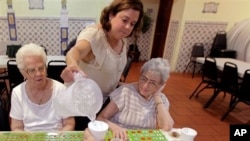A new study has found that elderly people who have many social interactions may live longer than those who are more socially isolated.
While numerous studies have linked loneliness and social isolation with an increased risk of death, researchers of the new study say loneliness itself isn’t the problem.
What’s the difference? According to Professor Andrew Steptoe of University College London, social isolation means limited or no contacts with friends and family, or involvement in clubs or sports.
“Loneliness is a more subjective experience to do with a person’s feelings of companionship or feeling left out,” he says.
Because there’s a lot of overlap between clinical definitions of loneliness and social isolation, Steptoe and his colleagues wanted to see which factored more significantly into rates of increased mortality.
Working with data from a large study of older men and women called the English Longitudinal Study of Aging, Steptoe says they found no significant correlation between higher death risks and loneliness. But upon conducting statistical analysis, he says, his colleagues found "that social isolation was indeed related to higher risk of dying."
Aside from the obvious fact that socially active individuals, due to their increased likelihood of being in physical proximity to others, are more likely to survive a life-threatening situation, Steptoe offers some clues about why people with more social contacts are likely to live longer.
“Receiving encouragement to do things or not to do things, other people to help you with your medications or take you to the doctor, and things of that sort — which are not so much to do with the emotional side of it as more the practical side — it could be that those are the more important factors here,” he says.
Steptoe says research similar to his Britain-based study is underway in other parts of the world, where traditional social patterns are changing.
“In many developing countries, of course, people with a rural background are moving into the larger cities, where the social connections are very, very different," he says. "Often it’s the younger people who are moving, leaving older people in the more rural areas, and so these kind of social connections are going to be changed dramatically.”
The research by Steptoe and colleagues into the role social isolation plays in higher death risk among the elderly is published online by the Proceedings of the National Academy of Sciences.
While numerous studies have linked loneliness and social isolation with an increased risk of death, researchers of the new study say loneliness itself isn’t the problem.
What’s the difference? According to Professor Andrew Steptoe of University College London, social isolation means limited or no contacts with friends and family, or involvement in clubs or sports.
“Loneliness is a more subjective experience to do with a person’s feelings of companionship or feeling left out,” he says.
Because there’s a lot of overlap between clinical definitions of loneliness and social isolation, Steptoe and his colleagues wanted to see which factored more significantly into rates of increased mortality.
Working with data from a large study of older men and women called the English Longitudinal Study of Aging, Steptoe says they found no significant correlation between higher death risks and loneliness. But upon conducting statistical analysis, he says, his colleagues found "that social isolation was indeed related to higher risk of dying."
Aside from the obvious fact that socially active individuals, due to their increased likelihood of being in physical proximity to others, are more likely to survive a life-threatening situation, Steptoe offers some clues about why people with more social contacts are likely to live longer.
“Receiving encouragement to do things or not to do things, other people to help you with your medications or take you to the doctor, and things of that sort — which are not so much to do with the emotional side of it as more the practical side — it could be that those are the more important factors here,” he says.
Steptoe says research similar to his Britain-based study is underway in other parts of the world, where traditional social patterns are changing.
“In many developing countries, of course, people with a rural background are moving into the larger cities, where the social connections are very, very different," he says. "Often it’s the younger people who are moving, leaving older people in the more rural areas, and so these kind of social connections are going to be changed dramatically.”
The research by Steptoe and colleagues into the role social isolation plays in higher death risk among the elderly is published online by the Proceedings of the National Academy of Sciences.




